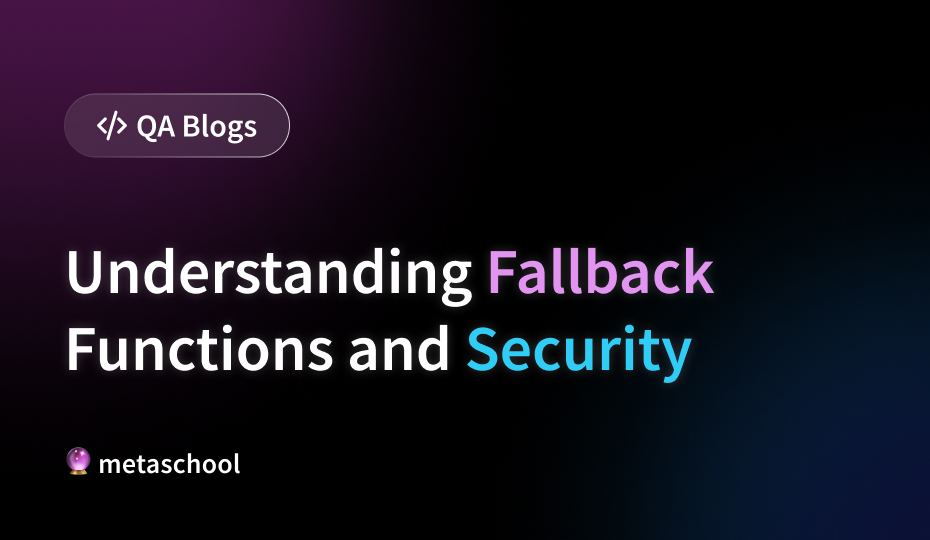Table of Contents
In the realm of Solidity smart contracts, the ability to receive Ether is crucial for many applications. But what if you want someone to be able to send Ether to your contract without explicitly calling a function? While it might seem intuitive at first, directly sending Ether to a contract address by itself isn’t quite as straightforward.
Imagine a donation box on the street. People can walk by and toss in money (Ether) without needing to interact with a specific person (function). However, unlike a physical box, a smart contract needs clear instructions on how to handle incoming Ether. This is where fallback functions come into play.
Understanding Fallback Functions: The Gatekeepers of Incoming Ether
Solidity contracts can have special functions called fallback or receive (or both) that are automatically triggered whenever someone sends Ether directly to the contract address, without calling any other function. These functions act like gatekeepers, deciding what to do with the incoming Ether.
Here’s a breakdown of how fallback functions work:
- Transaction Sent: Someone decides to send Ether to your contract address. This could be a one-time donation, a payment for a service, or anything else your contract is designed for.
- No Explicit Function Call: There’s no specific function being called within the transaction. It’s just a plain Ether transfer to the contract address.
- Fallback Function Activated: Since no other function is called, Solidity checks if the contract has a
fallbackorreceivefunction defined. - Code Execution (Optional): If a
fallbackorreceivefunction exists, its code is executed. This allows you to handle the incoming Ether programmatically within your contract.
🔥 Check this course out: Build a Semi-Fungible ERC404 Tokens’ Marketplace
Why do Fallback Functions Matter?
Fallback functions offer flexibility for receiving Ether in a contract. You can use them for various purposes:
- Simple Ether Collection: In the donation box analogy, a basic
fallbackfunction could simply log the amount of Ether received and potentially store it in the contract’s balance. - Conditional Logic: You could write more complex
fallbackfunctions that perform actions based on the amount of Ether received or the sender’s address. - Integration with Other Functions: The
fallbackfunction can interact with other functions within your contract, triggering additional functionalities upon receiving Ether.
However, there’s a crucial caveat: fallback functions can be security hazards if not implemented carefully. Here’s why:
- Unintended Behavior: Since
fallbackfunctions are executed automatically, any errors within them can lead to unexpected behavior or even a complete halting of the contract. This can potentially lock up funds or leave the contract in an unusable state. - Reentrancy Attacks: These are a type of vulnerability where a malicious function can call your contract recursively (multiple times within a single transaction), potentially manipulating the
fallbackfunction and stealing Ether.
Best Practices for Secure Fallback Functions
To ensure your contract receives Ether safely, follow these best practices:
- Keep it Simple: For basic Ether collection, a minimal
fallbackfunction that logs and stores the received amount is sufficient. Avoid complex logic within thefallbackfunction itself. - Use Modifiers: Solidity provides modifiers like
nonReentrantto help prevent reentrancy attacks. These modifiers can add an extra layer of security to yourfallbackfunction. - Consider Alternatives: In some cases, using a public function explicitly designed to receive Ether might be a safer approach compared to relying solely on the
fallbackfunction.
🔥 Check this course out: Build Hogwarts Sorting Hat dApp on Polygon
Example: A Simple Donation Contract
Here’s an example of a basic contract with a fallback function for collecting donations:
pragma solidity ^0.8.0;
contract Donation {
// Track total donations
uint256 public totalDonations;
// Fallback function to receive Ether
fallback() external payable {
totalDonations += msg.value; // Add received amount to total
}
}
- It has a public variable
totalDonationsthat keeps track of the total amount of Ether ever sent to the contract address. - The
fallbackfunction automatically activates whenever someone sends Ether directly to the contract address without calling any specific function. - Inside the
fallbackfunction, themsg.value(amount of sent Ether) is added to thetotalDonationsvariable, effectively accumulating all donations received by the contract.
Conclusion
While fallback functions offer a way to receive Ether in contracts, use them cautiously and prioritize security by keeping them simple and using appropriate modifiers. In some situations, alternative approaches like explicit functions for receiving Ether might be preferable.
Try it out, ask us questions, and tell us how it went by tagging Metaschool on Social Media.
Follow us on –
🔮Twitter – https://twitter.com/0xmetaschool
🔗LinkedIn – https://www.linkedin.com/company/0xmetaschool/
